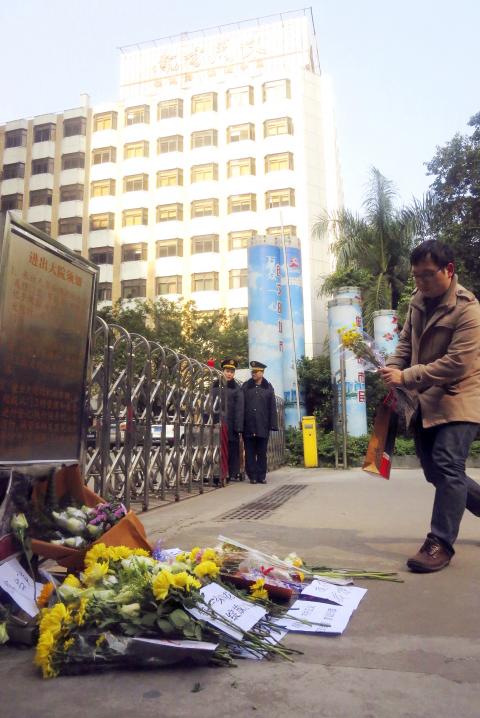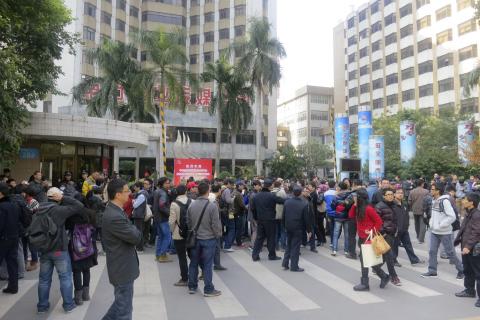Protesters yesterday gathered at the Guangzhou headquarters of a Chinese newspaper at the center of a censorship row, in a rare demonstration of public support for media freedom in the country, with both the Taiwanese government and the leaders of a student movement against Chinese influence in local media closely watching the developments.
Hundreds of people, including students and white-collar workers, gathered outside the Southern Weekly’s office, holding signs and shouting slogans calling for freedom of speech, political reform, constitutional governance and democracy.
The demonstration came after censors on Thursday last week blocked a New Year article in the popular liberal newspaper calling for the realization of a “dream of constitutionalism in China” to protect people’s rights.

Photo: Reuters
“I feel that the ordinary people must awaken,” one of the protesters, Yuan Fengchu, said by telephone. “The people are starting to realize that their rights have been taken away by the Communist Party and they are feeling that they are constantly oppressed.”
Another protester, Guangzhou writer and activist Wu Wei (吳偉), who goes by the pen name Ye Du (野渡), said the protest marked a rare instance in which Chinese were making overt calls for political freedom since large-scale pro-democracy demonstrations were crushed in a military crackdown in Beijing’s Tiananmen Square in 1989.
“In other cities, we’ve seen people march, but most of the time they are protesting environmental pollution or people’s livelihood issues,” Wu said. “Here, they are asking for political rights, the right to protest. The Southern Weekly incident has provided an opportunity for citizens to voice their desires.”

Photo: Reuters
Last week’s act of censorship caused journalists and their supporters, including students at nearby Sun Yat-sen University, to write open letters expressing their outrage.
“Our yielding and our silence have not brought a return of our freedom,” Hong Kong University’s China Media Project quoted the students as saying in their petition on Sunday. “Quite the opposite, it has brought the untempered intrusion and infiltration of rights by [government] power.”
The protests had turned into a real-time melee in the blogosphere on Sunday. The newspaper’s economics and environmental news staff appeared to say they were on strike, while editors loyal to the government shut down or took control of the paper’s official microblogs. One widely distributed staff declaration with 90 signatures said the publication’s microblogs were no longer authentic.
Searches for “Southern Weekly” on one popular microblogging site were blocked yesterday.
The crackdown on freedom of expression comes despite pledges of change from the new Chinese Communist Party (CCP) leadership, headed by Chinese Vice President Xi Jinping (習近平), which has promised a more open style of governance since the party congress in November.
A Chinese-language editorial in the state-run Global Times, which has links to the CCP, said China was determined to maintain the status quo when it came to the media.
“No matter whether these people [angered by the censorship] are happy or not, common sense says it is impossible to have the kind of ‘free media’ they dream of under China’s social and political systems today,” it said. “The media will by no means become a ‘political special area’ in China.”
The media would “undoubtedly be a loser” if it sought to fight the government, it said.
The commentary did not run in the paper’s English-language edition.
The editiorial followed an open letter from Southern Weekly staff which — in an unusually vocal response to authorities’ censorship — called for the resignation of Guangdong provincial propaganda official Tuo Zhen (庹震), who was said to have removed the weekly’s article and replaced it with a different version.
Eighteen Chinese academics, including legal professors, economists, historians and writers, have also signed an open letter calling for Tuo’s dismissal. Peking University law professor He Weifang (賀衛方), who was among the signers, said the newspaper needed to be defended from censorship.
“The Southern Weekly is known as a newspaper that exposes the truth, but after Tuo Zhen arrived in Guangdong, he constantly put pressure on the paper. We need to let him know that he can’t do this,” He said. “This incident is a test to see if the new leadership is determined to push trhough political reforms.”
Yesterday’s protests also took on a Taiwanese element, with calls for the singing of a song that decades ago served as a clarion call for the democratic movement in Taiwan.
According to posts on microblogging site Sina Weibo, organizers have invited supporters to gather at Guangzhou Parkway at noon tomorrow to show their support by singing the song Beautiful Island (美麗島), one of the key inspirational songs used by the pro-democracy movement in Taiwan during authoritarian rule.
The Chinese authorities prohibited the song in 1980.
Taiwanese youths were also paying attention to what was happening in Guangzhou.
Lin Fei-fan (林飛帆), one of the student leaders in the recent wave of Taiwanese protests against the monopolization of and growing Chinese influence in local media, told the Taipei Times that the movement was closely watching developments surrounding the Southern Weekly incident.
Lin said that although there was no direct link between the student those who signed the petition at the Chinese universities on Sunday, he hoped that both sides could inspire and learn from each other.
“No matter what, the movements from both sides will serve as an inspiration for one another,” he said.
Lin also said the Chinese had an interest in ensuring that freedoms in Taiwan were not undermined by Beijing’s influence.
“Although Taiwan enjoys freedom of the press and democracy, they are weakening at the moment. As they fight for their own freedom, Chinese students should seek to prevent this from occurring in Taiwan,” he said.
“Chinese students are very brave in fighting despite being under very strict government control,” he said, adding that state control over the media and limits to freedom were much more stringent in China.
Lin said he hoped that Chinese would continue to fight for their rights and that people who desire freedom would unite.
“Taiwanese students will support them, always,” he said.
Mainland Affairs Council Minister Wang Yu-chi (王郁琦) said the council was paying attention to the issue of press freedom in China and had invited Chinese journalists to visit Taiwan, adding that the council hoped they would be influenced by the country’s freedoms.
Additional reporting by Shelley Shan

INVESTIGATION: The case is the latest instance of a DPP figure being implicated in an espionage network accused of allegedly leaking information to Chinese intelligence Democratic Progressive Party (DPP) member Ho Jen-chieh (何仁傑) was detained and held incommunicado yesterday on suspicion of spying for China during his tenure as assistant to then-minister of foreign affairs Joseph Wu (吳釗燮). The Taipei District Prosecutors’ Office said Ho was implicated during its investigation into alleged spying activities by former Presidential Office consultant Wu Shang-yu (吳尚雨). Prosecutors said there is reason to believe Ho breached the National Security Act (國家安全法) by leaking classified Ministry of Foreign Affairs information to Chinese intelligence. Following interrogation, prosecutors petitioned the Taipei District Court to detain Ho, citing concerns over potential collusion or tampering of evidence. The

‘FORM OF PROTEST’: The German Institute Taipei said it was ‘shocked’ to see Nazi symbolism used in connection with political aims as it condemned the incident Sung Chien-liang (宋建樑), who led efforts to recall Democratic Progressive Party (DPP) Legislator Lee Kun-cheng (李坤城), was released on bail of NT$80,000 yesterday amid an outcry over a Nazi armband he wore to questioning the night before. Sung arrived at the New Taipei City District Prosecutors’ Office for questioning in a recall petition forgery case on Tuesday night wearing a red armband bearing a swastika, carrying a copy of Adolf Hitler’s Mein Kampf and giving a Nazi salute. Sung left the building at 1:15am without the armband and apparently covering the book with a coat. This is a serious international scandal and Chinese

Seventy percent of middle and elementary schools now conduct English classes entirely in English, the Ministry of Education said, as it encourages schools nationwide to adopt this practice Minister of Education (MOE) Cheng Ying-yao (鄭英耀) is scheduled to present a report on the government’s bilingual education policy to the Legislative Yuan’s Education and Culture Committee today. The report would outline strategies aimed at expanding access to education, reducing regional disparities and improving talent cultivation. Implementation of bilingual education policies has varied across local governments, occasionally drawing public criticism. For example, some schools have required teachers of non-English subjects to pass English proficiency

TRADE: The premier pledged safeguards on ‘Made in Taiwan’ labeling, anti-dumping measures and stricter export controls to strengthen its position in trade talks Products labeled “made in Taiwan” must be genuinely made in Taiwan, Premier Cho Jung-tai (卓榮泰) said yesterday, vowing to enforce strict safeguards against “origin laundering” and initiate anti-dumping investigations to prevent China dumping its products in Taiwan. Cho made the remarks in a discussion session with representatives from industries in Kaohsiung. In response to the US government’s recent announcement of “reciprocal” tariffs on its trading partners, President William Lai (賴清德) and Cho last week began a series of consultations with industry leaders nationwide to gather feedback and address concerns. Taiwanese and US officials held a videoconference on Friday evening to discuss the